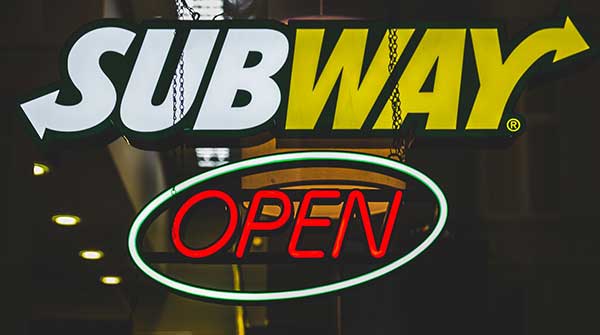Amid store closures, lawsuits and scandals, can Subway find success once again?
 Roark Capital, a private equity firm that boasts a portfolio encompassing Arby’s, Baskin-Robbins, Buffalo Wild Wings, and Dunkin’ Donuts, has made headlines with its recent announcement to acquire Subway, the world’s second-largest restaurant chain by outlet count, boasting over 37,000 locations globally.
Roark Capital, a private equity firm that boasts a portfolio encompassing Arby’s, Baskin-Robbins, Buffalo Wild Wings, and Dunkin’ Donuts, has made headlines with its recent announcement to acquire Subway, the world’s second-largest restaurant chain by outlet count, boasting over 37,000 locations globally.
Notably, Canada alone houses over 2,900 Subway restaurants, with the province of Saskatchewan featuring an astonishing ratio of one Subway restaurant for every 9,800 residents.
This monumental deal, valued at a potential $9.55 billion, including debt, contingent upon achieving specified financial benchmarks, marks a historic moment in the food industry. This agreement represents the culmination of an extended and competitive auction process that commenced in February of this year, garnering significant attention from various private equity firms.
 Photo by Szymon |
| Related Stories |
| Subway faces a rough road to restore its reputation
|
| The old Tim Hortons we all know is just fading away
|
| Don’t wait until your business is in pain to find a cure
|
Nevertheless, the substantial investment of over $9 billion in a restaurant chain facing challenges raises eyebrows, particularly considering that Subway’s global sales peaked at $18 billion in 2012 and have encountered hurdles ever since.
Over the past decade, Subway has grappled with formidable competition in the sandwich industry. Initiating store closures in 2016, the chain continued this trend between 2018 and 2019, closing over 2,000 outlets across the United States and Canada. Moreover, Subway’s foray into the breakfast market aimed at diversifying meal offerings beyond lunch, dinner, and snacks, but the outcomes proved, at best, mixed.
Subway’s recent history has also been marred by public relations challenges, commencing with concerns regarding ingredient authenticity and supply chain issues. In 2017, a CBC Marketplace investigation cast doubt on the authenticity of certain Subway ingredients, culminating in a lingering defamation lawsuit that is yet to be resolved – a detrimental development for any restaurant business. Another lawsuit, alleging the absence of tuna in Subway’s products, was recently dismissed, but not before causing substantial damage to the brand’s reputation.
The chain also faced criticism regarding serving sizes and the accuracy of its “foot-long” sandwiches, with consumers taking to social media platforms to express their concerns. The Jared Fogle scandal further compounded Subway’s woes. Formerly celebrated as a spokesperson who famously shed 245 pounds by consuming Subway sandwiches, Fogle’s image took a severe hit in 2015 when he was arrested.
Pleading guilty to charges involving child pornography and illicit activities with a minor across state lines, he is currently serving a 15-year prison sentence in Colorado. Earlier this year, a documentary titled Jared from Subway: Catching a Monster provided an in-depth look at his life and the legal proceedings surrounding his case.
Subway’s frailty is underscored by its sales per store, which significantly lags behind industry leaders. While Chick-fil-A, for instance, reports sales exceeding $5 million per individual store, Subway does not even feature among the top 30. Subway has often been regarded as an accessible entrepreneurial opportunity, but its aggressive expansion approach led to an oversight of market analysis, as outlets were established in areas with uncertain chances of success.
Most Subway outlets operate as franchisee-owned businesses. The 2021 New York Post report alleging financial exploitation of immigrant franchisees has further exacerbated the chain’s troubles.
In early 2022, Subway Canada introduced its “Eat Fresh Refresh” campaign, enlisting new brand ambassadors, primarily athletes, and revitalizing menu items such as rice bowls and enhancing ingredients with Canadian cheddar cheese and smashed avocado. While these changes were noticeable, Subway faces a considerable rehabilitation journey ahead.
Roark Capital’s acquisition of Subway presents a unique opportunity for revitalization, focusing on enhancing revenue per outlet by reducing the number of restaurants, optimizing supply chain operations, and refining the branding strategy. However, franchise owners may find themselves on edge amid the uncertainty of what lies ahead.
Dr. Sylvain Charlebois is senior director of the agri-food analytics lab and a professor in food distribution and policy at Dalhousie University.
For interview requests, click here.
The opinions expressed by our columnists and contributors are theirs alone and do not inherently or expressly reflect the views of our publication.
© Troy Media
Troy Media is an editorial content provider to media outlets and its own hosted community news outlets across Canada.

